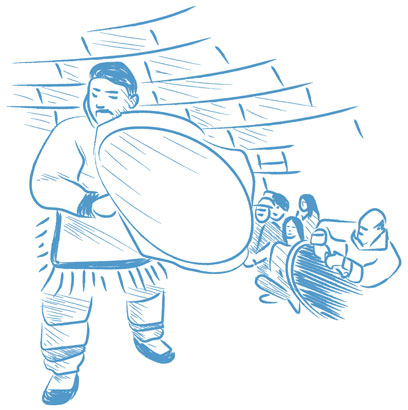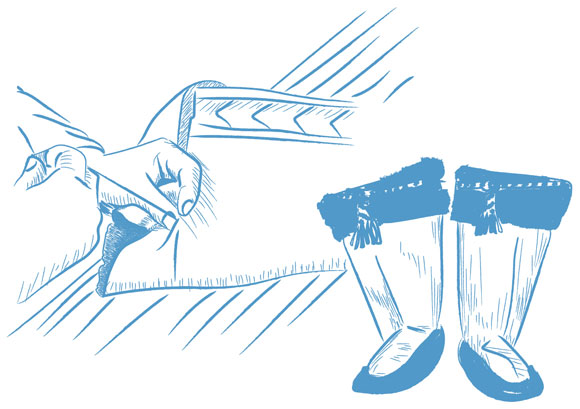Noun endings can be organized into different categories depending on how a noun is used in a sentence.
Basic form
A noun can be used in its most basic form when it is the subject of the sentence. The subject is the person(s) or thing(s) that performs the action that is described.
Angutit qilaujjagajuqattalauqsimajut.
The men would often play the drum.

the -up ending
A noun indicating a possessor (someone who owns or has a relation with another noun) may take the ending -up or related endings:
igluup paanga
the door of the house
Ikpiarjuup mittarvinga
Arctic Bay’s landing strip
Piitaup nukanga
Peter’s younger brother
In some dialects, the -up ending may be shortened to -p.
Piitap nukanga
Peter’s younger brother
This happens in all dialects when the ending follows two vowels:
umiap iqqua
the stern of the boat
-up is only added when the possessor is singular:
angutiup qukiutinga
the man’s gun
angutiik qukiutingik
the two men’s guns
angutit qukiutingit
the (3+) men’s guns
The -up ending is also used for the subject of a double person verb:
Mialiup nagligijanga
Mary loves him; the one Mary loves
object endings
In Inuktut, we can mark the object of a verb (the person or thing that undergoes the action) by adding the ending -mik to a noun if it is singular, or -nik if it is dual or plural:
Nutaarmik atigitaaqtuq.
He got a new parka.
Igluliuqtuq angijumik
He is making a big house.
Kiviuq maliksaqtuq inungmik tupirmut.
Kiviuq followed a person into the tent.
Ukungningak kamiingnik piuksaqtunga.
I like this pair of skin boots.

This group of endings is also used with words that describe or modify the object:
Qassinik tuktunik takuqqauvit?
How many caribou did you see?
Pingasunik.
Three of them.
This group of endings can also be used to describe the materials with which something is made:
Saunirmik panalik.
He has a snow knife made of bone.
in, on, to, for, from
Nouns can be used to describe where someone is, or where they are coming from or going to. In this case the noun in the sentence that describes a location takes an ending. These endings, too, have a singular form and a dual/plural form:
| Singular | Dual/Plural | |
|---|---|---|
| in/on | –mi | –ni |
| to/for | –mut | –nut |
| from | –mit | –nit |
Some examples:
Umiarmit niujuq.
One person got off the boat.
Umiarnit niuraijut.
They are unloading things from the boats.
Umiarmi iksivaaqtuq.
He is sitting in the boat.
Umiarnut agjaqsijut.
They are carrying things to the boats.

through / by way of
These endings are used when a noun is a physical path to something or a means of moving from one place to another.
Ikaaqtut sikukkut.
They are crossing over the ice.
Qimuksikkut angirrarasuqujaulluni.
They wanted him to go home by dogteam.
Igalaakkut anijut.
They got out through the window.
igalaatigut anijut
They got out through the windows.
like
The endings in this category are used to convey the idea of similarity to something else.
Sivulittitut pinasuaqtugut.
We are trying to do things like our ancestors.
Taututtiaruniiliqtuq ataatattiamitut.
He is losing his sight, like his grandfather.